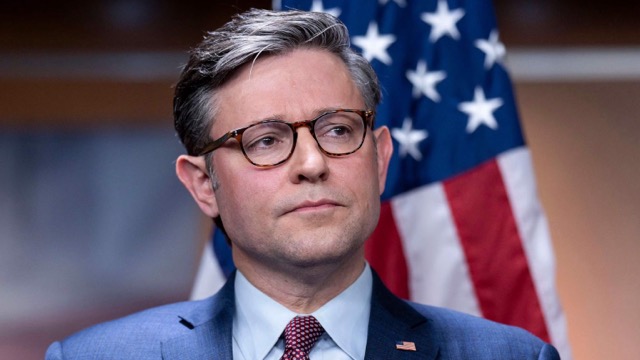Trump has made it clear that he expects Congress to address the federal debt ceiling before he takes office on January 20, demanding that House Speaker Mike Johnson rework the short-term spending deal to include a debt ceiling hike or elimination.
“There won’t be anything approved unless the debt ceiling is done with,” Trump told ABC News on Thursday morning. “If we don’t get it, then we’re going to have a shutdown, but it’ll be a Biden shutdown.”
Trump has also issued a strong warning to Republican lawmakers, vowing on Wednesday night to primary any Republican who opposes a debt limit hike.
Johnson now faces a difficult balancing act. Acquiescing to Trump’s demand could put him at odds with House conservatives whose support he will need to remain Speaker in January. Many conservatives oppose raising the debt ceiling without “structural reforms” to reduce spending. At the same time, Trump’s backing will be essential for Johnson to fend off potential challenges to his leadership, as Trump previously helped quell a House uprising in May.
Trump has signaled in interviews that his support for Johnson depends on the Speaker’s handling of debt limit negotiations. “If the Speaker acts decisively, and tough, and gets rid of all of the traps being set by the Democrats, which will economically and, in other ways, destroy our country, he will easily remain Speaker,” Trump told Fox News. However, in another interview, Trump struck a cautious tone, saying, “We’ll see,” when asked if he still had confidence in Johnson.
The pressure underscores Trump’s determination to assert his influence over Congress ahead of his return to the White House.
Johnson has been meeting with various House factions to explore options for a government funding compromise that includes a debt ceiling extension. These discussions come after a bipartisan compromise fell apart, facing opposition from both Trump and X CEO Elon Musk.
If Congress ignores Trump’s demands and opts not to address the debt ceiling before Friday’s funding deadline, it could undermine Trump’s influence before his second term begins. For Johnson, the stakes are even higher. The debt ceiling controversy, combined with tensions over funding negotiations, could jeopardize his January bid for Speaker. On Wednesday, Johnson introduced a spending bill criticized by Republicans for including too many Democratic priorities, further straining relations with conservatives.
Johnson may also have to rely on Democratic votes to pass any deal, given the Senate and White House remain under Democratic control. Adding the debt ceiling to the mix could deepen Republican frustration with his leadership, potentially weakening his position in January.
“The problem is, any debt ceiling deal has to be obviously bipartisan,” said Sen. Kevin Cramer (R-ND). “There are lots of Republicans who have never voted for one, and I’m pretty sure never will, and I’m not even sure Donald Trump could talk them into it. That means the price for it will be even greater. It’s not like it gets more conservative.”
The Treasury Department had initially projected that the debt limit would be reached in January, with “extraordinary measures” allowing the U.S. to avoid default until June. Republicans had anticipated using unified control of Washington next year to negotiate from a stronger position. However, Trump views the debt ceiling as a potential political trap early in his presidency and is pushing for action now, despite the complexity of doing so with a razor-thin majority in the House.
Although Trump’s demand to eliminate the debt ceiling entirely is unlikely, Congress could agree to a one- or two-year extension to delay the crisis. Democrats, including Sen. Elizabeth Warren (D-MA), are eager to incorporate a debt ceiling resolution into the spending bill, with Warren expressing support for Trump’s proposal. However, some Democrats are reluctant to revisit a spending deal already negotiated.
“We need to pass this bill, and we can get to that later,” said Rep. Marcy Kaptur (D-OH), a member of the House Appropriations Committee. “I think some of the people around the president-elect need to understand the legislative process and not stall it.”
Johnson has reportedly been in discussions with Vice President-elect J.D. Vance and incoming legislative director James Braid about what a new spending deal might entail. A vote on the legislation could happen as soon as Thursday, but Democratic buy-in will be crucial. House Minority Leader Hakeem Jeffries (D-NY) described discussions of a debt limit hike as “premature” on Thursday.
Conservative opposition remains a significant hurdle. “I think if we’re going to do debt ceiling increases, we ought to have structural changes to start dealing with these issues,” said Sen. Rick Scott (R-FL), who works closely with House conservatives.
The House Freedom Caucus has historically demanded steep spending cuts alongside any debt ceiling increase. In 2023, they pushed a bill calling for $5 trillion in cuts, but then-Speaker Kevin McCarthy negotiated a far narrower compromise with President Joe Biden, leading to McCarthy’s ouster months later.
Now, Democrats are resisting similar concessions to the GOP’s right flank, setting the stage for another high-stakes showdown over the debt ceiling.
 Telegram is where we really talk. Don't miss out!
Telegram is where we really talk. Don't miss out!








